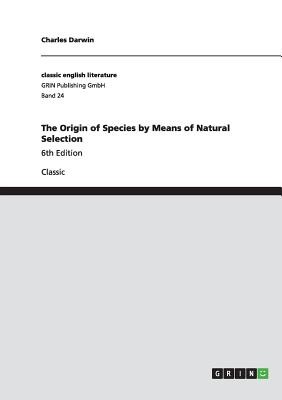
- Išsiųsime per 12–18 d.d.
- Autorius: Charles Darwin
- Leidėjas: GRIN Verlag
- ISBN-10: 3640227980
- ISBN-13: 9783640227983
- Formatas: 14.8 x 21 x 3.1 cm, minkšti viršeliai
- Kalba: Anglų
- Extra -15 % nuolaida šiai knygai su kodu: ENG15
The Origin of Species by Means of Natural Selection (el. knyga) (skaityta knyga) | knygos.lt
Atsiliepimai
Aprašymas
Classic from the year 2008 in the subject English Language and Literature Studies - Literature, language: English, abstract: I will here give a brief sketch of the progress of opinion on the Origin of Species. Until recently the great majority of naturalists believed that species were immutable productions, and had been separately created. This view has been ably maintained by many authors. Some few naturalists, on the other hand, have believed that species undergo modification, and that the existing forms of life are the descendants by true generation of pre existing forms. Passing over allusions to the subject in the classical writers (Aristotle, in his "Physicae Auscultationes" (lib.2, cap.8, s.2), after remarking that rain does not fall in order to make the corn grow, any more than it falls to spoil the farmer's corn when threshed out of doors, applies the same argument to organisation; and adds (as translated by Mr. Clair Grece, who first pointed out the passage to me), "So what hinders the different parts (of the body) from having this merely accidental relation in nature? as the teeth, for example, grow by necessity, the front ones sharp, adapted for dividing, and the grinders flat, and serviceable for masticating the food; since they were not made for the sake of this, but it was the result of accident. And in like manner as to other parts in which there appears to exist an adaptation to an end. Wheresoever, therefore, all things together (that is all the parts of one whole) happened like as if they were made for the sake of something, these were preserved, having been appropriately constituted by an internal spontaneity; and whatsoever things were not thus constituted, perished and still perish." We here see the principle of natural selection shadowed forth, but how little Aristotle fully comprehended the principle, is shown by his remarks on the formation of the teeth.), the first author who in modern times has treated it in a scientific spirit was Buffo
EXTRA 15 % nuolaida su kodu: ENG15
Akcija baigiasi už 1d.14:55:45
Nuolaidos kodas galioja perkant nuo 5 €. Nuolaidos nesumuojamos.

- Autorius: Charles Darwin
- Leidėjas: GRIN Verlag
- ISBN-10: 3640227980
- ISBN-13: 9783640227983
- Formatas: 14.8 x 21 x 3.1 cm, minkšti viršeliai
- Kalba: Anglų
Classic from the year 2008 in the subject English Language and Literature Studies - Literature, language: English, abstract: I will here give a brief sketch of the progress of opinion on the Origin of Species. Until recently the great majority of naturalists believed that species were immutable productions, and had been separately created. This view has been ably maintained by many authors. Some few naturalists, on the other hand, have believed that species undergo modification, and that the existing forms of life are the descendants by true generation of pre existing forms. Passing over allusions to the subject in the classical writers (Aristotle, in his "Physicae Auscultationes" (lib.2, cap.8, s.2), after remarking that rain does not fall in order to make the corn grow, any more than it falls to spoil the farmer's corn when threshed out of doors, applies the same argument to organisation; and adds (as translated by Mr. Clair Grece, who first pointed out the passage to me), "So what hinders the different parts (of the body) from having this merely accidental relation in nature? as the teeth, for example, grow by necessity, the front ones sharp, adapted for dividing, and the grinders flat, and serviceable for masticating the food; since they were not made for the sake of this, but it was the result of accident. And in like manner as to other parts in which there appears to exist an adaptation to an end. Wheresoever, therefore, all things together (that is all the parts of one whole) happened like as if they were made for the sake of something, these were preserved, having been appropriately constituted by an internal spontaneity; and whatsoever things were not thus constituted, perished and still perish." We here see the principle of natural selection shadowed forth, but how little Aristotle fully comprehended the principle, is shown by his remarks on the formation of the teeth.), the first author who in modern times has treated it in a scientific spirit was Buffo




Atsiliepimai